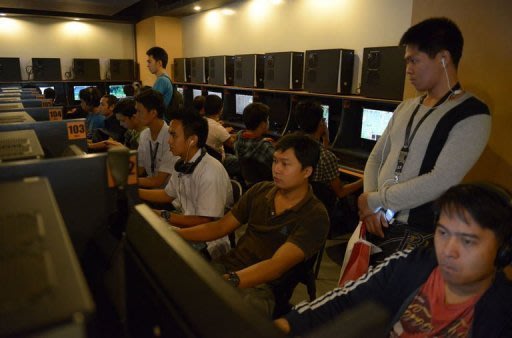
The Philippines may boast of being the social networking hub, but nearly four out of five Pinoy adults still have no Internet access at home, results of a new poll showed.
A total of 79 percent of Filipinos reported being offline at home, U.S.-based pollster Gallup found in a survey of 1,000 adults in each of 148 countries globally.
The report put the Philippines among the 100 countries where less than a majority of respondents answered yes when asked the question "Does your home have access to the Internet?"
This, even as Gallup stressed that the results "reflect the percentage of adults who answered yes, rather than the percentage of households in a given country with Internet access."
"Additionally, it is possible that adults have access to the Internet through other means, including schools and universities, public libraries, Internet cafes, and smartphones," Gallup said.
However, the recent findings are consistent with a United Nations report in September, which claimed that 71 percent of Pinoys had no access to Internet through any means.
The same report meanwhile noted that such dismal figures for Internet access did not prevent Pinoys from using social networks, with 75 percent accessing such sites in 2011.The report also hinted that this relatively low home Internet penetration rate may be attributed to the fact that the Philippines is among the world's more highly populated nations.
"China and India are the world's most populous nations, and as such, home Internet coverage as a percentage of adults may be relatively slow to increase," Gallup said.
"In fact, except for the United States, Japan, and Russia, the world's next most populous nations, including Indonesia, Pakistan, Nigeria, Bangladesh, Mexico, and the Philippines, still find most adults offline at home," it added.
Burundi, Madagascar and Mali emerged as the countries with the least Internet access, with all respondents saying they are offline at home.
At 99 percent meanwhile, were Togo, Burkina Faso, Benin, Rwanda, Congo, Central African Republic, Niger and Cambodia.
"Worldwide, 32 percent of adults in 2011 reported having home Internet access," Gallup said, noting a "steady uptick" from 29 percent in 2010 and 25 percent in 2009.Singapore and Sweden topped the list of countries in terms of home Internet access with 93 percent of adults able to go online at home.
They were followed by Denmark, 92 percent; the Netherlands, 91 percent; New Zealand and Australia, 89 percent; as well as Canada, Taiwan, Ireland and South Korea, 87 percent.
Internet access at home, Gallup said, has implications on a nation's economic strength and wellbeing as well as its youth development, worker productivity and civic engagement.
"The more people who have Internet access in their homes, the more likely they are to have easy, around-the-clock access to consume news and information, and in some cases, to sell and buy goods online," Gallup said.
"Home Internet access provides students with access to critical materials for education, workers with ways to stay connected and productive during hours away from their place of business, and all citizens with news and resources they can use to learn and connect with others," it added.The global rankings meanwhile had the world's largest economies falling "between the extremes of home Internet access."
"The world's largest economy--the United States--is 23rd on the list, with 80 percent of adults reporting Internet access," Gallup said.
Not far behind are the third and fourth largest economies Japan and Germany, with 73 percent and 77 percent home Internet access respectively.
"The world's second largest economy--China--falls in an entirely different category, with 34 percent reporting home Internet access, on par with the global average," Gallup said.

0 comments:
Post a Comment